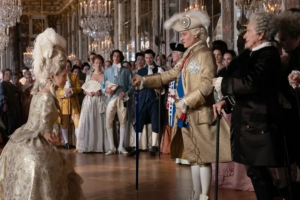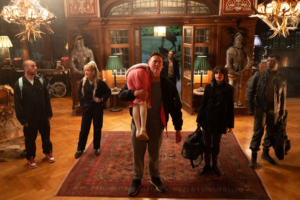Reviewed by GREG KING
Director: Stephane Briz
Stars: Vincent Lindon, Karine de Mirbeck, Matthieu Schiller.

“The measure of a man is the way he bears up under misfortune.” This quote is certainly an apt way to illustrate the title of this miserable dour, grim and relentlessly downbeat drama that screened at the French Film Festival earlier in the year.
The film focuses on 51-year-old Thierry Taugourdeau (played by veteran Vincent Lindon) an out of work factory worker who copes with an unfeeling bureaucracy in his search to find work. He is forced to attend useless training courses to meet a quota, but they do nothing to help him gain employment. He struggles to survive on the dole of 500 euros a month.
The film follows Thierry through a series of rather awkward, frustrating and confrontational meetings as he tries to gain a job to support his family. He clashes with his job network agency, a bank manager as he tries to negotiate a loan, a teacher to discuss the progress of his mentally handicapped son Matthieu, and faces harsh criticism of his interview technique. All of this is rather soul destroying and adds to a feeling of hopelessness. But there are a few moments of joy and respite at home with his wife (Karine de Mirbeck), especially as the pair take dance lessons, and his handicapped son (Matthieu Schiller).
Eventually though he lands a job working security for a large supermarket. The job requires him to monitor the customers to prevent shoplifting. But it also requires him to spy on his fellow co-workers to ensure they are not stealing from the company. Thierry is essentially a decent man, and this eventually takes a toll on him, leaving him feeling more dispirited.
This moving and bracing portrait of a middle aged man dealing with an unfeeling bureaucracy offers up a powerful critique of contemporary society in post-GFC France and an indictment of capitalism. It taps into the tough economic circumstances and brutal realities of Europe, and its themes of unemployment, poverty, the daily struggle to make ends meet and the compromises of daily life will resonate strongly with audiences. The Measure Of A Man has been heavily influenced by the grim social realism of Ken Loach, although Loach’s films contain much more humour. The film will also remind audiences of the Dardenne brothers’ recent humanist drama Two Days One Night, starring Marion Cotillard, in which the staff of a small company are given the choice of accepting a pay cut that would enable the firm to avoid laying off an employee.
Director Stephane Briz (Mademoiselle Chambon, etc) brings a documentary like realism to the material and uses naturalistic sounding dialogue. He serves up a slow burning muted howl of outrage at the injustice and unfairness of the system. Many who have dealt with Centrelink and job network agencies will empathise with Thierry’s frustration and the debilitating effects of long term unemployment.
Briz adopts an understated approach to the material that leads to a nicely ambiguous anticlimactic ending that may disappoint many. He uses lots of long takes, and some scenes tend to linger longer than they should. Briz and his cinematographer Eric Dumont use steady camera work and close ups to focus on the central character.
This is the third collaboration between Briz and Lindon, whose restrained performance here as an everyman worn down by the drudgery of life won the Best Actor Award at Cannes and a Cesar for his subtle and nuanced performance. He has played noble, heroic figures before in dramas like Welcome, etc, and is perfectly cast here. Lindon’s performance here is a largely internal one, and his hangdog features and weathered face and harried expression perfectly suits the character who always feels as if he is being judged and found wanting. The supporting cast comprises of nonprofessional actors who deliver naturalistic performances.
The Measure Of A Man makes for a rather depressing and grim night at the movies and is not a film that will hold broad appeal for audiences.
★★☆



